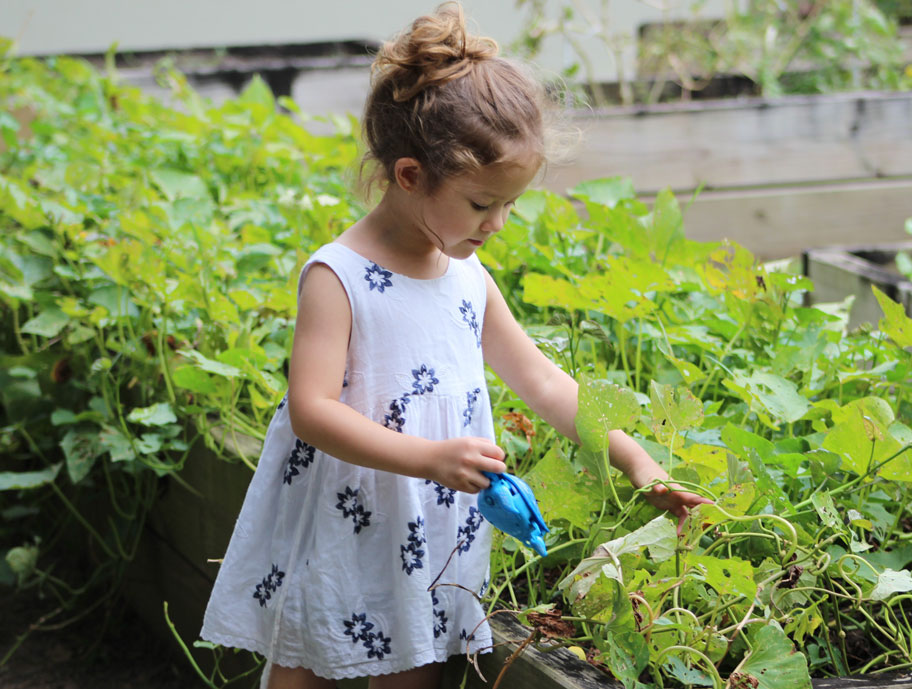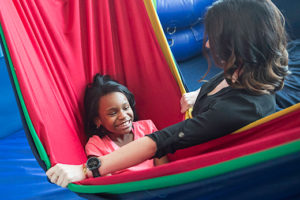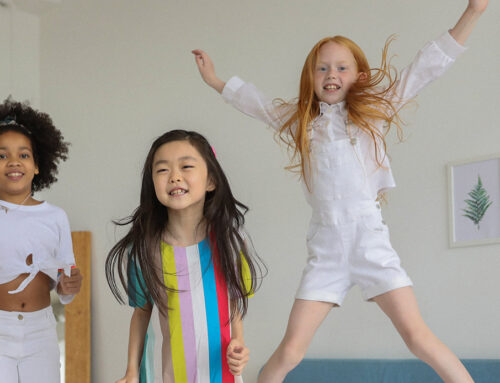DIY Vegetable Garden

Looking for a fun and functional way to build messy play and executive functioning skills into your summertime? Summer gardens are a wonderful way to work on attention, sequencing, and direction following in a sensory-friendly way!
Executive Functioning Skills
Executive functioning skills are “higher order thinking processes that enable an individual to achieve self-determination goals and engage independently and purposefully” (Radomski & Trombly Lathem, 2014). These skills are essential for schoolwork, home, and day-to-day life! To better understand executive functioning skills and definitions, here is a comprehensive list:
- Attention – There are five components of attention including: focused, sustained (length of time), selective (competing stimuli), alternating (shifting back and forth between stimuli), divided attention (multiple simultaneous stimuli).
- Planning – The ability to make and execute plans based on pre-set goals.
- Organization – The ability to arrange critical details/steps/groups of information to follow a plan and execute tasks.
- Inhibition – The ability to resist acting without thinking.
- Self-monitoring – The ability to control emotions, behaviors, and actions so that goals can be achieved and tasks completed.
- Mental flexibility – The ability to change plans or actions because of obstacles, new information, or mistakes.
- Working memory – The ability to hold, update, and manipulate information in one’s mind.
Gathering Materials
Planning and organizing are key concepts of executive functioning! Have your child make a list of materials you need to garden. Ask a series of open-ended questions to facilitate problem-solving. These may include:
What plants do you want?
What do plants need to grow?
What tools do we need?
How will we prevent a mess?
Foster your child’s sense of choice, autonomy, and decision making skills by allowing them to choose the plant and the planter!
Directions
Direction following requires a series of executive functioning skills including: attention, inhibition, self-monitoring, and working memory. Consider the ‘just right challenge’ when selecting directions to follow. A ‘just right challenge’ is selecting an activity that is just above the level your child is easily able to do.
Consider your child’s reading level and comprehension. Provide opportunities for multi-modal learning through written directions, visual pictures, and how-to videos.
As your child is going through a series of directions, try the following:
- Open-ended questions
- Goal, Plan, Check, Do – This is a strategy to improve organization, problem solving, and inhibition! Have your child stop, read, make a plan, and then act!
- Step back – Allow your child to make mistakes! Use these as learning moments and have them reflect on what they could have done differently.
Garden: Sample Steps
Materials:
- Seeds (carrots, radishes, and sprouts are easiest!)
- Soil
- Pot
- Gloves
- Child-sized shovel
Directions:
Step 1: Put on gloves.
Step 2: Fill 1/3 of pot with soil.
Step 3: Add desired seeds.
Step 4: Fill 2/3 of pot with soil.
Step 5: Place in sunlight.
Step 6: Water according to directions.
Care and Maintenace
Once completed, develop a plan for taking care of the plant. Determine how much water it needs, how frequently, and how much sunlight it will need to grow! Encouraging them to check-in and monitor their plant can help to improve planning, direction following, and working memory!
Food for Thought: Sustainable Gardens
Building a child-directed home or school garden can be a great educational tool to discuss affordable, sustainable, and easily accessible food! This is a great time to have critical conversations with your children about food scarcity, food desserts, agriculture, and sustainability! For more information and educational resources, check out Alice Water’s Edible Schoolyard Project or the Yale Sustainable Food Program!
Additional Resources
- Edible Schoolyard Project – An American Chef and food activist, Alice Waters, pioneered a school program to educate children on the importance of farm-to-table sustainable lunches!
Citations
Obermeyer, I. (2018). Executive function for school-age students. SIS Quarterly Practice Connections, 3(4), 2–5.
Radomski, M. V. & Trombly Latham, C. A. (2014). Assessing abilities and capabilities: cognition. In Weisser-Pike, O (Ed.), Occupational therapy for physical dysfunction (pp. 123-127). Lippincott Williams & Wilkins.

Eyas Landing is a therapy clinic with a mission to provide evidence-based and family-centered therapy services for children, adolescents, and their families. The primary goal is to deliver relationship-based interventions within the most natural environments and to empower families to reach their full potential. To achieve this goal, our highly educated, compassionate staff dedicates time and expertise to create experiences that maximize therapeutic outcomes. The strength, determination, and perseverance of our clients are evident as they succeed in therapy, and ultimately in their daily lives.
Eyas Landing offers a wide range of comprehensive services including Speech Therapy, Occupational Therapy, Physical Therapy, ABA Therapy, Social Work, Family Therapy, and Neuropsych testing. Services are provided throughout the Chicagoland area via Telehealth, In-Home, and in our state of the art clinic.
Want to learn more or you have a specific question? Feel free to connect with us here!


